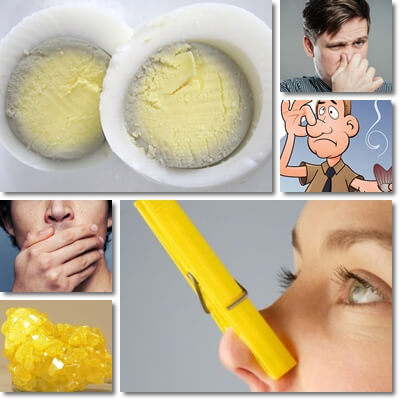It’s common knowledge that bowel movements and gas smell bad. Which makes it socially acceptable, that is, accepted as being physiologically normal. But what about burps that smell like rotten eggs? Is that normal? Foul-smelling belching, whether it’s reminiscent of rotten eggs, sulfur, gas, dirty socks or something else, is actually quite common, and not always a sign something is wrong. If you’ve recently noticed or have been made aware of the fact that your burps smell like rotten eggs or something just as bad, don’t panic yet. Burping that smells bad is not irrefutable proof of serious disease. But do read on to learn what causes it, what you can do about it and what other symptoms to look out for.
What is burping?
Burping is a natural process that helps eliminate air trapped in the upper part of the digestive system (the stomach), relieving pressure and associated discomfort or pain. Because it’s air, it shouldn’t smell like anything. But the reality is burping is almost never odorless, at least not in those eating foods that are themselves odoriferous. Not to mention that it’s not always the air that gets in the stomach via the mouth that is eliminated, but also ‘air’ that is produced inside the digestive tract, as a result of native gastrointestinal bacteria processing food. And that air that is generated inside the digestive tract is bound to smell like something, proof being that flatus, which is also generate in the digestive tract, is almost always odoriferous.

So burping should smell like something, even if it’s not a very discernible odor. It’s when the burping that is bad smelling won’t stop or hurts or is acidic and feels like it’s burning your throat that you have to consider an underlying issue. Occasional bad smelling burps and gas and even some bloating are not necessarily a reason for concern, especially if they can be traced back to straying from your usual diet such as eating high-fiber, gassy foods, odoriferous foods or drinking carbonated beverages.
What causes egg or sulfur burps?
Burping that smells foul, like rotten eggs, sulfur or gas, can be caused by a number of things, some innocuous, some not so much. Here are the most common causes to consider:
Sulfur burps: by-products of normal digestion
In the first stages of digestion, ingested food is broken down by chewing, with the help of saliva, then in the stomach, thanks to the action of stomach juices and digestive enzymes. But lower in the digestive tract, bacteria and other microorganisms digest the smallest particles and that results in fermentation, which creates air. A lot of times, the air is eliminated as gas/flatulence, but can also be eliminated as burps which smell bad because of by-products of bacterial activity during digestion. Smelly gases produced during digestion include hydrogen sulfide, methyl mercaptan, dimethyl sulfide, dimethyl disulfide, dimethyl trisulfide and cause bad smelling, rotten egg or sulfur burps and gas.

Certain foods
Foods that cause bad-smelling burps, and gas, include: egg yolk, mayonnaise made with egg yolk, red meat (beef, pork, game), organ meat (liver), cold cuts and heavily processed foods high in protein, fish and seafood (shrimp, scallops etc.), legumes (beans, peas, chickpeas, lentils), cruciferous vegetables (cabbages, Brussels sprouts, broccoli, cauliflower, mustard, horseradish), onions and garlic, pickled foods (sauerkraut), full-lactose milk and dairy, high-fiber foods (whole grains, nuts, seeds), root vegetables (potatoes, jicama, cassava), chicory root for coffee substitute, protein supplements such as whey supplements, and eating a high-protein, low-carb diet.
Dietary changes
Diet dictates gastrointestinal flora particularities. What this means is that eating the same things for a long while will result the presence of selected gastrointestinal microbiota (bacteria, yeasts, archaea and other microorganisms) in your digestive system, apt to process the kinds of food you normally eat. Switching your diet all of a sudden and introducing foods you don’t normally eat, foods that require particular microorganisms for digestion, or a certain number of them, can cause air and bloating, followed by the elimination of said air in potentially odoriferous forms, namely bad smelling burps and gas. Consider any brave new dietary changes you may have made recently if you’re dealing with burping that smells bad, like rotten eggs or something else.
Food intolerance or food sensitivities
If you have a milk intolerance or, more exactly, lactose intolerance, drinking milk or eating dairy, whether yogurt or cheese or cream, can cause not only excessive burping that won’t stop, but also burping that smells bad, like rotten eggs, sulfur or gas. If you are sensitive to the effects of dietary fiber, eating whole grains such as whole wheat or oats, taking supplements that contain inulin, or drinking chicory as a coffee substitute may cause rotten egg burps and excessive gas. Be on the lookout for foods that trigger symptoms and consider excluding them from your diet to see if the situation improves.
Certain dietary habits
What you eat determines whether you burp or not, and what those burps will smell like. For example, if you are in the habit of drinking carbonated beverages, whether naturally sparkling water or soft drinks, you’ll likely be burping more than usual. If you also commonly eat eggs, garlic, onions, fish or foods that are generally known to cause bad smells, chances are your burps will also smell bad, like rotten eggs or sulfur or gas.
Fish odor syndrome
Trimethylaminuria, or fish odor syndrome, is condition in which the body is unable to properly process trimethylamine, resulting in bad body odor, including bad smelling burps. Bacteria in the gastrointestinal tract produce trimethylamine as a by-product of digestion. But people with fish odor syndrome lack an enzyme needed to metabolize trimethylamine and turn it into an odorless compound, so it builds up in the body. It’s then released in sweat, exhaled air and urine, resulting in a bad, fish, sulfur or rotten egg smell.
Foods that cause fish odor syndrome and bad body odor include: eggs (yolks), soy, red meat such as beef, pork and game, fish, shrimp, scallops and other seafood, legumes such as beans and peas, wheat bran, wheat germ, cruciferous vegetables such as cabbage, Brussels sprouts, spinach, sauerkraut and even some fruits (avocado, dried plums, watermelon etc.).
Acid reflux disease (GERD)
There are several telling symptoms of acid reflux disease, including excess stomach acidity, regurgitation of stomach juices, heartburn, a sour, acidic or metallic taste in the mouth, sore throat, coughing in the morning, bad breath and excessive burping that smells like rotten eggs or sulfur. The first step to treating acid reflux is managing your diet. See here what foods to eat and to avoid for acid reflux and other tips and solutions to treat the condition.
Gastritis and stomach ulcers
Gastritis is an inflammatory condition of the stomach that causes increased production of stomach acid and predisposes to ulcers and more serious issues long-term. It’s not uncommon for gastritis to debut with excessive burping that won’t stop no matter what you do. Because of the highly acidic pH of stomach acid, it’s possible the burps smell acidic, metallic even, or like rotten eggs or sulfur.
The burping itself may feel acidic as a result of the excess production of stomach acids and cause a burning sensation in the throat or a bad taste in the mouth. Abdominal pain is also a common symptom in gastritis as well as stomach upset post-meal.
If you want to get rid of gastritis for good, in addition to taking medication such as proton-pump inhibitors to temporarily reduce production of stomach acid, you need to eat bland, absorbent foods. See my list of foods to eat and to avoid for gastritis to help you start your gastritis diet today.
Certain medication
Antibiotics cause serious imbalances in gut flora and can result in digestive disturbances. For those with fish odor syndrome, antibiotics and other medication containing sulfur compounds, nitrogen, choline and more are responsible for bad smells, including bad smelling burps and gas. Stomach acid-suppressing medication right after a large meal is also a possible cause.
Other causes of bad-smelling burps
- Helicobacter pylori infection – requires treatment with antibiotics and proton-pump inhibitors.
- Infections of the mouth – infected wounds or lesions in the mouth, gum infections, tooth decay.
- Infections of the intestinal tract such as gastroenteritis, whether bacterial, parasitic or other – require prompt and adequate treatment. Fever is a good indicator of infection.
- Bacterial overgrowth – sometimes, certain bacteria populations thrive, which can cause symptoms such as bloating, excessive gas and burping, diarrhea or foul-smelling burping, flatulence or bowel movements.
- An empty stomach – an empty stomach is producing acid to let you know it’s time to eat and that just smells bad.
- Celiac disease, Crohn’s disease and other inflammatory bowel conditions.
- High-protein, low-carb diets – because foods high in protein are also high in compounds that cause sulfur burps.
- Gastroparesis and nerve damage caused by diabetes.
- Eating a larger meal, high in protein, fatty foods or fried foods, and taking antacids or other medication that reduces stomach acid.
Symptoms to look out for
It’s best to see your doctor if you experience burping that smells bad, like sulfur, rotten eggs or something else. If you also notice any of the following symptoms, make sure you let your doctor know:
- Burping that won’t stop. Could indicate gastroesophageal reflux disease or a gastritis.
- Burping that hurts. Digestive pain should always be investigated by a medical professional.
- Burping that tastes or feels acidic. Can be a sign of acid reflux disease, gastritis and predispose to esophagus damage and an increased risk of esophageal cancer over time.
- Foul smelling burping and diarrhea. May hint at an infection, food intolerance, sensitivity or allergy.
- Sulfur burps and heartburn or chest pain. Common cause of acid reflux disease (GERD).
- Increased salivation. Could be a sign of excess stomach acidity.
- Nausea, vomiting, especially early in the morning when you wake up. Common symptoms of peptic ulcer.
- Bad breath. Potentially caused by an infection in the oral cavity.
- Bad body odor. Whether it’s an ammonia or garlic body smell, sweet or bad urine odor, have it investigated by a doctor.
- Coughing in the morning, waking up coughing at night – symptoms of chronic acid reflux.
- Abdominal pain, fever, frequent indigestion, loss of appetite, early satiety, significant and unintentional weight loss.
